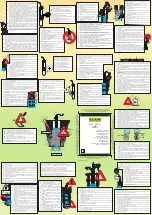
14
should be unplugged from the mains or the main
switch turned off and fuse unscrewed. A motor
protection switch is to be provided.
Basically, all work on the pump or pump unit should
only be carried out when the pump is stationary and
not under pressure. All parts must be allowed to
return to ambient temperature. Make sure that no-
one can start the motor during such word. It is
essential that the procedure for stopping the system
described in the Operating Instructions is observed.
Pumps or pump systems that carry media that are
dangerous to health must be decontaminated before
being taken apart. Safety Data Sheets for the
various liquids handled. Immediately the work has
been completed, all safety and protective devices
must be replaced or restarted.
Under EC machinery Directives, every machine
must be fitted with one or more emergency
command devices by which situations which
represent an immediate danger or which could later
be dangerous can be avoided.
If the emergency command device is no longer
op
erated after an emergency “off” switch has been
triggered, this must be maintained by blocking the
emergency command device until it is released
again. It should not be possible to block the device
without this tri
ggering an emergency “off” switch. It
should only be possible to release the device
through an appropriate action; this release should
not start the machine up again
– it should only make
it possible to start it up again.
If the power supply is interrupted or restored after
being interrupted or if it is changed in any other way,
this should not cause any danger (e.g. start up
without control or unexpected, pressure hammer).
2. Applications and Technical Description
2.1. Applications
Disposal units SEKAMATIK 50 E and SEKAMATIK 50 D
are used for pumping waste water, effluent or groundwater,
containing sludge or soft solids from rooms which are
below the sewer level.
The pumps must not be used for pumping of liquids
containing great quantities of abrasive solids, like sand or
stones. Before the pumping of chemically aggressive
liquids, the resistance of the pump materials must be
checked.
2.2. Product description
Smell-tight and watertight complete lifting station with one
or two pumps. The lifting station consists of a collecting
tank with all necessary ports for the connection of inlet
pipe, discharge pipe, air vent and manual diaphragm pump.
The disposal units SEKAMATIK 50 E and SEKAMATIK 50
D are equipped with a cutter system at the pump inlet which
cuts all soft solids to small particles, so that the liquid may
be pumped through small diameter discharge pipes of
50mmø.
The controllers incorporate contactors, a pc-board with
light-emitting diodes ( LEDs ) for indication of operating
condition and a level switch which, via a hose, is operated
by the liquid level in the collecting tank.
The LEDs indicate:
- Pump operation
- Phase sequence fault (three-phase only)
- Fault
- Alarm
A thermal switch incorporated in the motor windings will
protect the motor from overheating by cutting off the supply
to the pump via the controller.
A back-up accumulator maintaining the alarm signal in
case of supply failure is available as an accessory. The
accumulator is fitted inside the controller via a plug and
ensures that an alarm can be given within 15 hours after
the electricity supply has been switched off.
The accumulator is fully charged on delivery. The charging
time is approx. 100 hours. The accumulator is automatically
charged when the electricity supply is switched on.
Note: Used up accumulators must be disposes of in
accordance with local regulations.
Three-phase controllers incorporate a phase monitoring
function which does not, however, prevent the motor from
starting in the event of wrong phase sequence of the mains
connection.
In addition to the LEDs, the controller front cover features:
-
Function selector with the positions: ‘Test’ (manual
operation), ‘Aus’ (turn off) and ‘Auto’ (automatic
operation).
- On/off switch for built-in acoustic alarm.
SEKAMATIK 50 D (twin station)
The controller of SEKAMATIK 50 D automatically ensures
an even distribution of operating hours on both pumps by
changing the starting sequence after each pump stop.
When the liquid level in the tank reaches the start level,
one pumps is started. If the liquid level rises further, the
other pump is started as well. This pump will run until its
stop level is reached. The operating pump will stop, when
the lowest stop level is reached.
If the liquid level continues to rise when both pumps are
operating, an alarm is given until the liquid level is lowered
below the alarm level.
2.3. Technical Data
Discharge
SEKAMATIK 50 E and SEKAMATIK 50 D
BSP 2" M
Voltage
1Ph-motor (Model W)
230 V
3Ph-motor (Model D)
400 V
Speed
SEKAMATIK 50 E and SEKAMATIK 50 D
2900 rpm
Insulation class
H
Enclosure class
Pump motor
IP 68
Control box
IP 54
Cable
Unit
– control box
3,0 m
Control box - plug
0,8 m
Cable type
Unit
– control box
A05RN-F...
Control box - plug
H07RN-F...
Control power consumption
15 W
Ambient temperature
0° up to 40°C
Storage temperature
-30° up to
+50°C
Noise level during operation, 1,60 m from the
ground
70d(B)A
SEKAMATIK 50 E, SEKAMATIK 50 D
Inlet height
180 mm
250 mm
Tank volume
46 l
46 l
Operating volume
24 l
31 l
Содержание LOWARA Sekamatik 50 D
Страница 167: ...167 ...















































